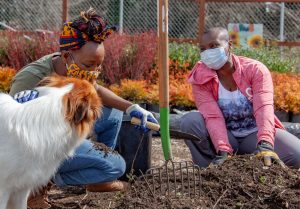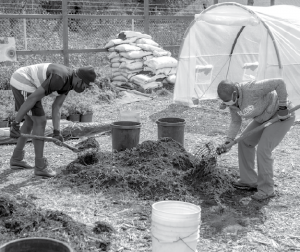A diversion, a refuge and a pantry
It’s Saturday afternoon and we are at the Victory Garden, a fenced 2-acre plot owned by the Thurston County Food Bank on Martin Way in Lacey.
Mercy Kariuki-McGee is kneeling in a bed of newly enriched dirt, and looks up from her dirt mound: “This place saved us last year. We’d be sitting at home not doing much and someone would say, ‘Let’s go to the garden and pick some tomatoes!’” Mercy says there was plenty of food here last summer, fresh and delicious.
For diversion, refuge, nourishment—and healing
The garden began last year as a veteran-focused project initiated and managed by Beau Gromley of GRuB (Garden-Raised Bounty—see story on p.7). When it was started, the garden served as a diversion, a refuge and a pantry for members of the veterans’ community. Once the pandemic hit and the state went into a lockdown, the vets were not able to use the space as planned. Mercy Kariuki-McGee and her daughter Elisa McGee who are co-founders of the Haki Farmers Collective found this place at the end of last August after Mercy had a vision and saw a need for a healing space for black and indigenous people, and people of color (BIPOC).

The vision begins to bear fruit
It seems inevitable that Mercy and Deb Crockett, the Director of GRuB, would talk about a vision for a BIPOC farm. The conversation became a reality when GRuB accepted the request from Mercy and ELisa to allow the Haki project to share the farm. GRuB has been providing food access to the community for many years. They saw the benefit of a BIPOC-focused space and how the Victory Farm was exactly the place for it. Mercy and Elisa saw the opportunity to realize their vision of diversity, equity and inclusion within a framework of gardening and farming.
Today there are raised beds neatly arranged all over the place. Mercy, her husband and their daughter Elisa along with new volunteers have added more raised beds and filled them with soil made according to a recipe GRuB has been using for the last 20 years. The beds will be planted with vegetables, herbs, and medicinal herbs as well as flowers, inside a 10-foot perimeter of trees that will one day supply fruit.
Within the shared space, Haki will focus on producing food for the community, hosting community workshops and eventually offering a food sharing conversation with special guests. Haki will also be conducting some education programs through the North Thurston Public Schools while GRuB will focus on veterans’ programming.
Gathering for a day of work
That Saturday, the April sun had energized a scatter of masked volunteers unloading wheelbarrows full of dark, rich soil to prep traditional soil mounds; some building a new trail in the mini food forest, and others weeding the berry patches. There’s a tradition in Kenya where Mercy grew up, for getting a farm started in the spring, “We used to get together with everyone and meet at one farm in the morning and do everything that same day. Then we’d make a schedule for the next farm. And do that farm in one day. And then the next farm. It was the whole community involved, so good for the teens and youth.”
Reflecting on that experience, Mercy adds, “We need this kind of space that people can just come to sit and talk, to connect. You can’t really be relaxed just sitting around in the park anymore. You’re afraid police will come up and start asking you what you’re doing.”
Mercy has lived in Olympia more than two decades, and is part of the Afro-fusion Mazigazi Band, Mercy’s family also ran an East African restaurant in the historical Ben Moore’s where she encountered few members of the African-American community: “My people —and especially black folks—don’t come out unless there is a purpose. One goal of the Haki Farmers Collective is to change that. We have a purpose for sure,” she laughs.
The aim for this summer is for the small urban farm space in Lacey to provide visitors with fresh vegetables and to demonstrate how diaspora communities adapt their ancestral foods to grow here in the PNW. Acclimating crops while acclimating people.
Haki’s gardening framework is a roomy framework
In its first year, the Haki Farmers Collective has managed to join hands with an astonishing roster of partners to help realize its goal of reincorporating traditional farming knowledge and practices from migrant and indigenous communities into local farming activities. In addition to GRuB, the Haki Collective is working with the North Thurston School District and TOGETHER! as well as Thurston Community FarmLand Trust and Washington State University.
North Thurston Public Schools and TOGETHER!
Mercy and Elisa are in conversations with North Thurston (NTPS) about developing a CTE agriculture curriculum for student programs. The idea is to create a pathway to careers in farming and natural resource management. Haki’s approach to equity in working with schools and especially youth is that “we educate each other,” a vital message and experience for a future where everyone can coexist in harmony.
Discussions are also planned for including members of the Black Students’ Union in a mentorship program. This February North Thurston BSU students created a banner to hang on 4th Avenue during black history month to show solidarity with BLM.
Haki is also part of the NTPS Equity Advisory Team. In partnership with TOGETHER!, a local after school program they have been teaching food sovereignty concepts. Using examples of world food systems and Mercy’s own food system traditions the program gives students an understanding of how food is grown, where it comes from, and the impact of world food production on climate change and health.
WSU and TCFLT
A group of BIPOC farmers, researchers and educators from WSU is researching certain staple crops. This project will conduct a quantitative and qualitative needs assessment of culturally relevant staple crops within BIPOC farmer and consumer communities. It will assess best practices and develop next steps for reviving small-to-mid scale ecologically grown (biologically-intensive, organic and sustainable) staple food economies within BIPOC communities in Washington state. These communities are most likely to face barriers to healthy food access. The research team hopes this project can find ways to bring foods that matter to the BIPOC community closer to them.
The hope is that Haki can play a key role in representing the BIPOC communities in the South Sound area. By summer 2022, HFC anticipates being able to showcase diaspora crops. While the organization is awaiting farmland to steward from their partnership with TCLT, a local farmer has offered land in Little Rock for their use. This opportunity will help Haki expand food access in the South Sound as well as establishing a plant medicine and food forest space relevant to the BIPOC community.
Cultivating generational wealth
One of Haki’s aspirations is to close the gap to land access in the county, something that can only be done if the community is integral in building food systems that meet daily needs. This also requires finding ways to remove barriers to land ownership and creating generational wealth for BIPOC families. It begins by empowering people and giving them the tools that they need to sustain themselves for generations to come.
Mercy and Elisa and Beau hope that the Victory Farm (and their future urban farms) will become places for gathering for the community, to heal, celebrate and organize community events. Haki means “justice” in swahili, a term familiar by now to nearly everyone. Making a just community needs more than just saying it, it needs green spaces like this where everyone feels very welcome. Mercy says. “We hope we can create that here. Community needs that today”.
Mercy Kariuki-McGee and Beau Gromley contributed to this article.
Read more about HAKI mission and goals and the GRuB veteran contingent.

Be First to Comment